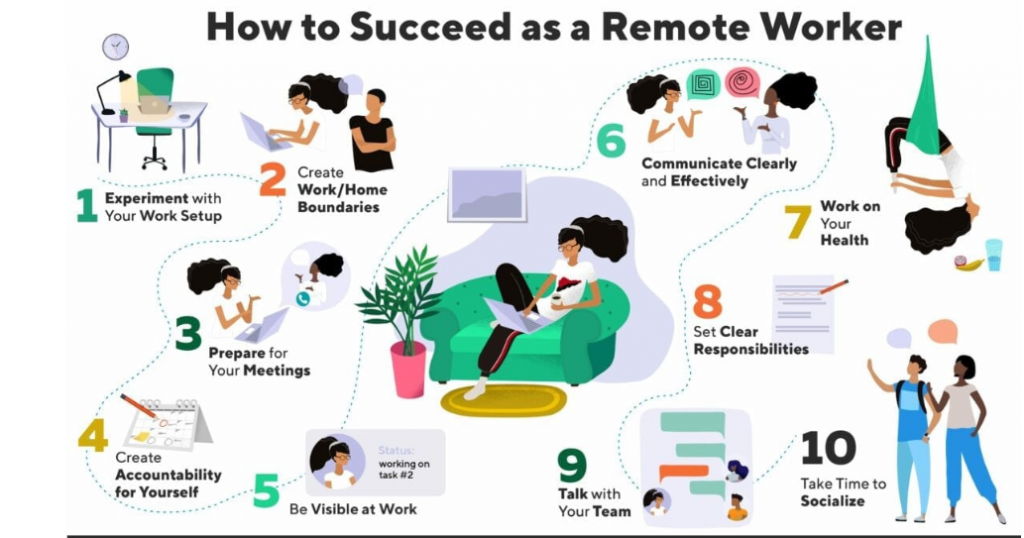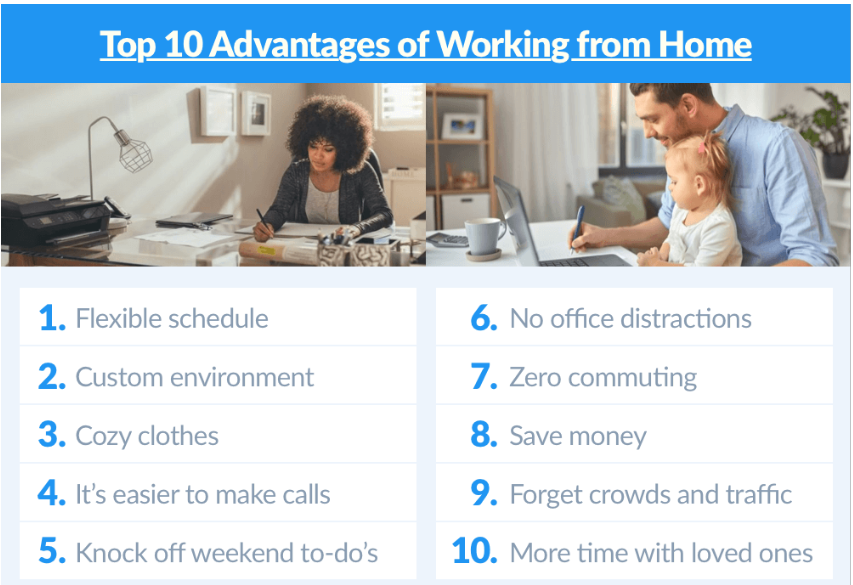Effective work from home and challenges & Advantages
Page Contents
How Effectively do Work from Home?
- While COVID-19’s effect continues to expand across the globe, entities like Gartner support the health and safety of employees by introducing work from home policies.
- Whereas this may not be a huge effect for already remote employees, the change may be difficult for those who are used to working in an office every day.
- However, you can reduce any disturbances with a little planning using some of the best practices below and continue to be a valuable member of your team. Here are 5 tips for beginners who work from home:
1. Defining a workspace
- Most of the remote employees make use of a designated room as office space in their home. Every morning you will “commute” over there and stay there in working hours. If you have no other room in your house, don’t be scared! What you need is a room where there will be no disturbances.
- Find a private room, (with a door if you can!) and set it up with all the essential work such as your laptop, notebook, pens, etc. Try to copy your office environment as closely as you can. This means that if you don’t have a TV in your dressing room, you shouldn’t have one on it while working from home.
2. keep flowing your daily routine
- When you’re used to doing exercise at 6:00 AM, read the paper or whatever else your morning consists of — try your best to stick to the same schedule.
- Take your shower, put on clean clothing, make your coffee, and get ready for the day of work.
- It would most certainly not add to efficiency as tempting as it may be to sleep until 10 minutes before your workday beginning and work from your pajama pants!
3. Develop and implement a routine

- Sticking to a daily routine often means making sure you stick to your usual schedule of work. If you work regularly with an hour for lunch in your office from 8:00 AM to 5:00 PM do the same at home.
- Even when you’re working remotely, it’s easy to lose track of time and when you’re ready to go home, you don’t ‘pack up for the day’ which can always lead to overwork. Set your own limits, and make sure to remain on top of your schedule.
4. Miscommunicate
- Communication is key to success in any situation, but it is much more essential when working remotely because you’re no longer only a few desks away from your colleagues and clients.
- When working remotely it can be easy to disconnect and lack of contact is never a positive thing for you — personally or professionally.
- When you have internal online chat messaging systems in your organization make sure you are still available. Call your colleagues or send them a greeting every day.
- If you’re not already doing so, schedule 1:1 weekly check-in meetings with your boss to determine your priorities, future projects, and daily activities.
- Using camera technology so that colleagues can see you. Even if you’re actually finding it really hard to manage not to have people around you, make a call and talk to someone.
5. Embrace breaks
- Once you continue working daily from home, you can find yourself sitting for hours at your desk — sometimes refusing to sleep, drink enough water, or simply stretch.
- Notwithstanding what you might think, breaks will encourage efficiency! Taking a walk away from the screen to get some fresh air, enjoying a healthy lunch, doing a little yoga, or simply breathing will also help you to re-energize and refocus.
Challenges Faced during Work from home
- The daily commute can be completely avoided and can be easily eliminated not only because of environmental reasons but also saves tonnes of money and energy for people.
- Multimedia-conferencing can and should be replaced by transporting people around the world for meetings (for cost and environmental reasons).
- The intention of calling meetings should be clear and specified, in addition to being very clear on who needs to attend and why.
Advantages of Work from Home
A) Appliances
- If you’re operating from home, all the facilities you’re having to need can come right out of your wallet – whether it’s internet access, power, or food/snacks that you might probably have picked up from the canteen and workplace pantry.
- While some of these costs are already factored into the household budget, due to increased consumption you can find a change in spending on these items.
B) Assurance
- One of the benefits of working in an office environment is that you don’t need to remain affixed to your desk and can take frequent breaks.
- It not only takes away your attention from problems but also reduces the pressure on your back caused by sitting for a long time in one place.
- From the other side, working from home will cause a decrease in your activity rates and raise your medical costs related to injuries caused by severe spinal pain, lower back, etc.
C) Incertitude
- At work, technical meetings above and beyond meetings and phone calls give you an understanding of the company’s situation, the growth strategies, and other important details that you may overlook when operating from home.
- This could affect your professional life outcomes and increase your employment stress and anxiety.
D) Transportation
- Once you’re WFH, that means you’re not likely to really go anywhere during working hours. In two-way travel, this route, you can save substantially.
- You could save anything between Rs. 100 a day for those who take public transport to over Rs. 200 a day for all who hire private transport, depending on your regular mode of transport.
know About- Way to bring back your business on track post-COVID-19



